高考英语听力--bird flu[下学期]
文档属性
| 名称 | 高考英语听力--bird flu[下学期] |
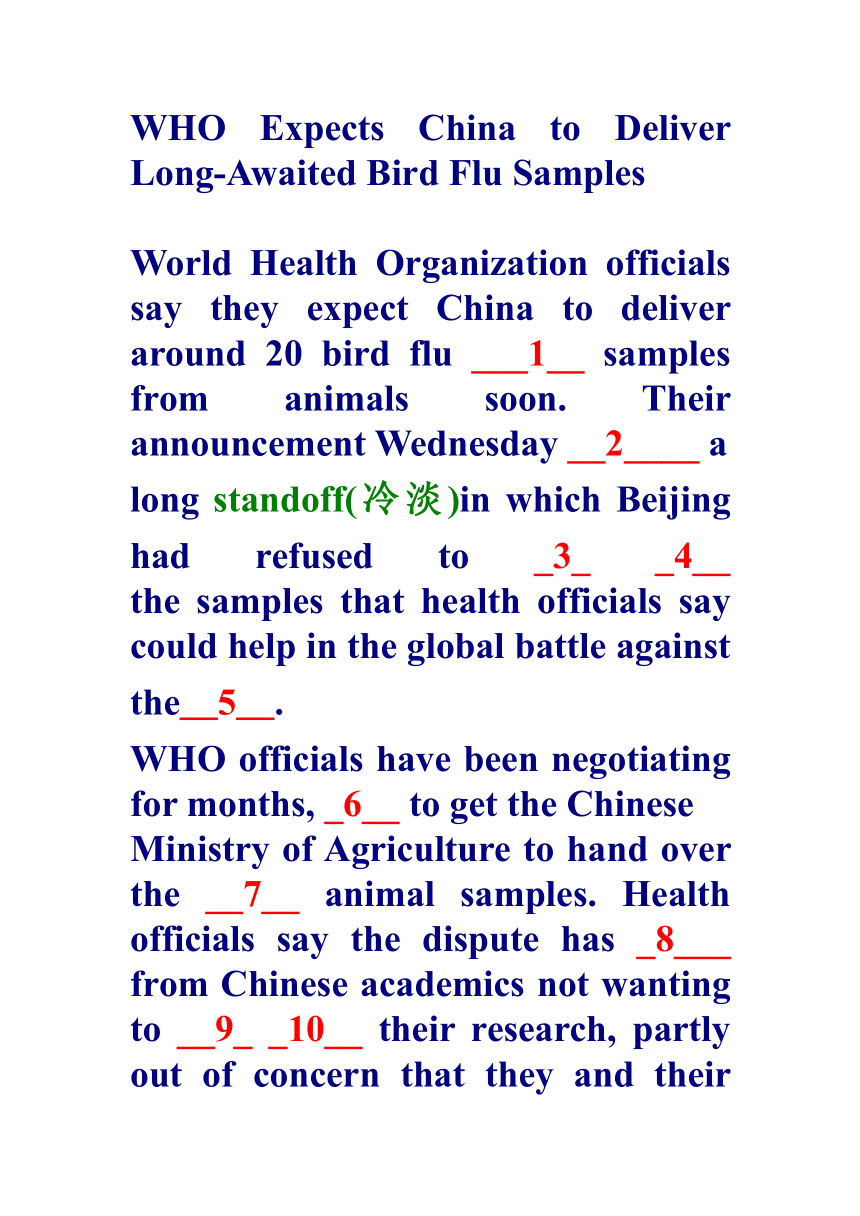
|
|
| 格式 | rar | ||
| 文件大小 | 317.4KB | ||
| 资源类型 | 教案 | ||
| 版本资源 | 通用版 | ||
| 科目 | 英语 | ||
| 更新时间 | 2006-04-11 00:00:00 | ||
图片预览

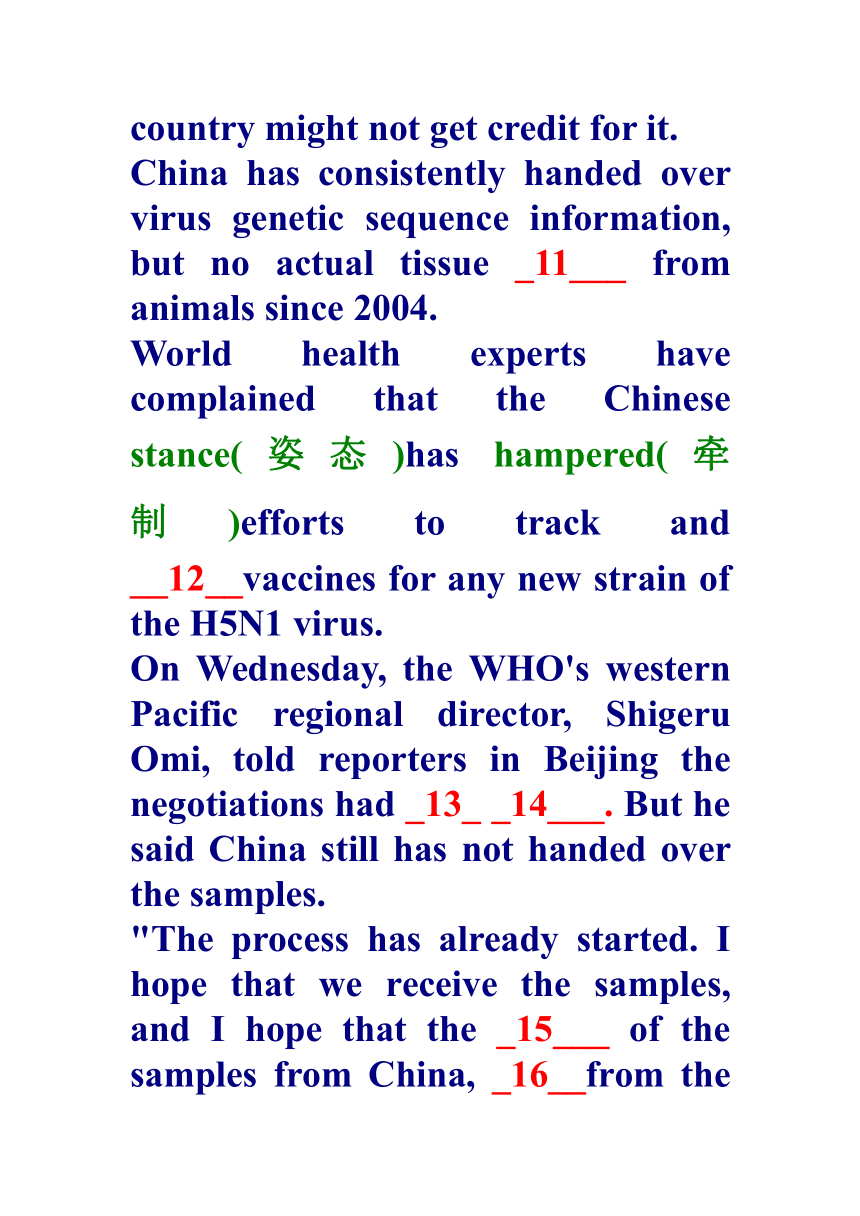
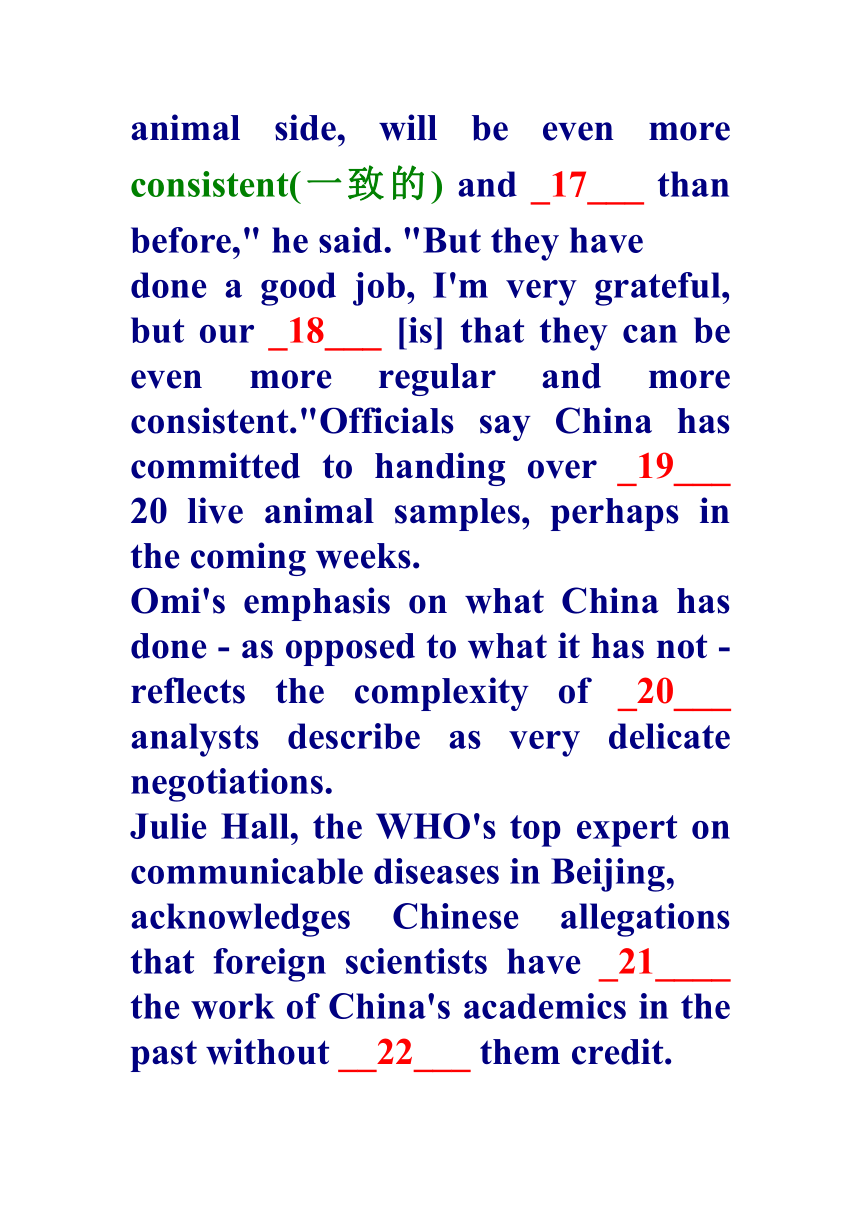
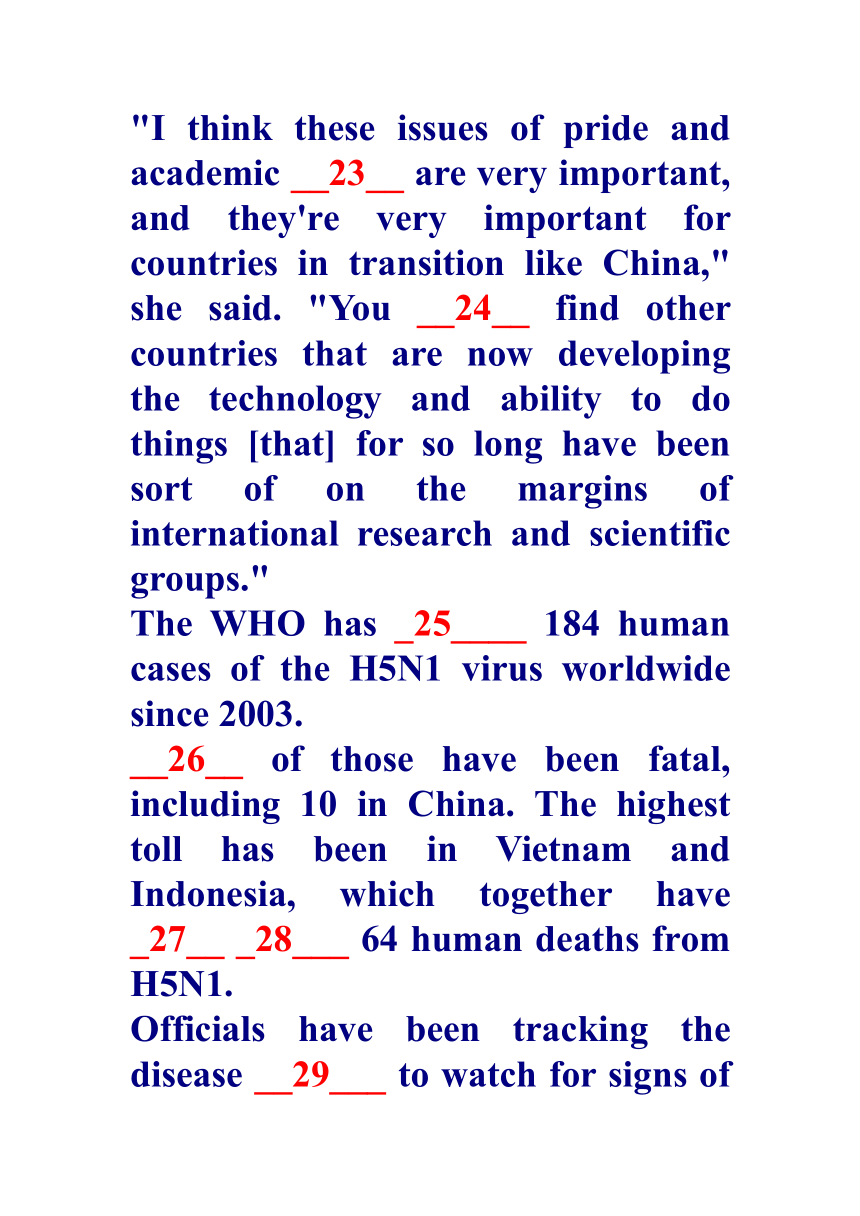
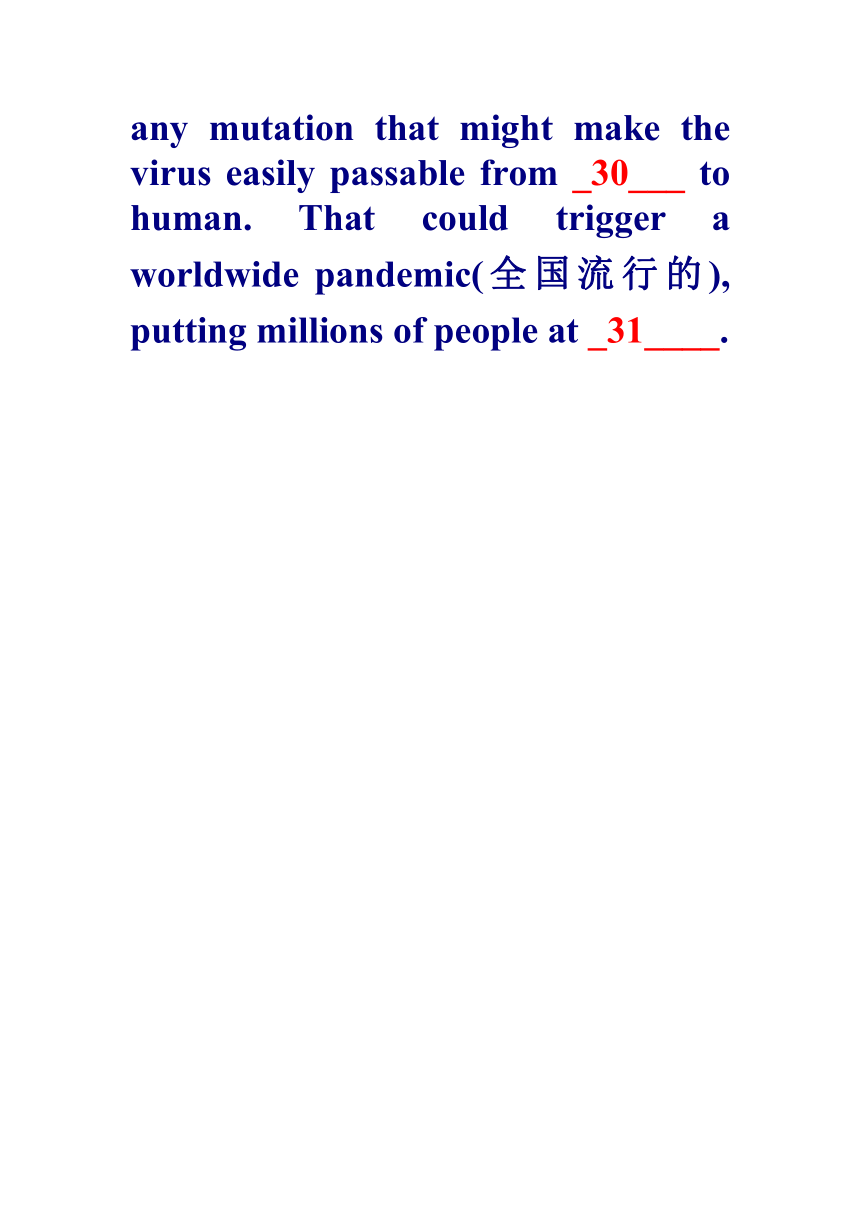
文档简介
WHO Expects China to Deliver Long-Awaited Bird Flu Samples
World Health Organization officials say they expect China to deliver around 20 bird flu ___1__ samples from animals soon. Their announcement Wednesday __2____ a
long standoff(冷淡)in which Beijing had refused to _3_ _4__ the samples that health officials say could help in the global battle against the_5_.
WHO officials have been negotiating for months, _6__ to get the Chinese
Ministry of Agriculture to hand over the __7__ animal samples. Health officials say the dispute has _8___ from Chinese academics not wanting to __9_ _10__ their research, partly out of concern that they and their country might not get credit for it.
China has consistently handed over virus genetic sequence information, but no actual tissue _11___ from animals since 2004.
World health experts have complained that the Chinese stance(姿态)has hampered(牵制)efforts to track and __12__vaccines for any new strain of the H5N1 virus.
On Wednesday, the WHO's western Pacific regional director, Shigeru Omi, told reporters in Beijing the negotiations had _13_ _14___. But he said China still has not handed over the samples.
"The process has already started. I hope that we receive the samples, and I hope that the _15___ of the samples from China, _16__from the animal side, will be even more consistent(一致的) and _17___ than before," he said. "But they have
done a good job, I'm very grateful, but our _18___ [is] that they can be even more regular and more consistent."Officials say China has committed to handing over _19___ 20 live animal samples, perhaps in the coming weeks.
Omi's emphasis on what China has done - as opposed to what it has not - reflects the complexity of _20___ analysts describe as very delicate negotiations.
Julie Hall, the WHO's top expert on communicable diseases in Beijing,
acknowledges Chinese allegations that foreign scientists have _21____ the work of China's academics in the past without __22___ them credit.
"I think these issues of pride and academic __23__ are very important, and they're very important for countries in transition like China," she said. "You __24__ find other countries that are now developing the technology and ability to do things [that] for so long have been sort of on the margins of international research and scientific groups."
The WHO has _25____ 184 human cases of the H5N1 virus worldwide since 2003.
__26__ of those have been fatal, including 10 in China. The highest toll has been in Vietnam and Indonesia, which together have _27__ _28___ 64 human deaths from H5N1.
Officials have been tracking the disease __29___ to watch for signs of any mutation that might make the virus easily passable from _30___ to human. That could trigger a worldwide pandemic(全国流行的), putting millions of people at _31____.
WHO Expects China to Deliver Long-Awaited Bird Flu Samples
World Health Organization officials say they expect China to deliver around 20 bird flu virus samples from animals soon. Their announcement Wednesday follows a
long standoff(冷淡)in which Beijing had refused to turn over the samples that health officials say could help in the global battle against the disease.
WHO officials have been negotiating for months, trying to get the Chinese
Ministry of Agriculture to hand over the live animal samples. Health officials say the dispute has resulted from Chinese academics not wanting to give up their research, partly out of concern that they and their country might not get credit for it.
China has consistently handed over virus genetic sequence information, but no actual tissue samples from animals since 2004.
World health experts have complained that the Chinese stance(姿态)has hampered(牵制)efforts to track and develop vaccines for any new strain of the H5N1 virus.
On Wednesday, the WHO's western Pacific regional director, Shigeru Omi, told reporters in Beijing the negotiations had made progress. But he said China still has not handed over the samples.
"The process has already started. I hope that we receive the samples, and I hope that the sharing of the samples from China, particularly from the animal side, will be even more consistent(一致的) and regular than before," he said. "But they have
done a good job, I'm very grateful, but our request [is] that they can be even more regular and more consistent."Officials say China has committed to handing over around 20 live animal samples, perhaps in the coming weeks.
Omi's emphasis on what China has done - as opposed to what it has not - reflects the complexity of what analysts describe as very delicate negotiations.
Julie Hall, the WHO's top expert on communicable diseases in Beijing,
acknowledges Chinese allegations that foreign scientists have published the work of China's academics in the past without giving them credit.
"I think these issues of pride and academic recognition are very important, and they're very important for countries in transition like China," she said. "You probably find other countries that are now developing the technology and ability to do things [that] for so long have been sort of on the margins of international research and scientific groups."
The WHO has confirmed 184 human cases of the H5N1 virus worldwide since 2003.
One hundred three of those have been fatal, including 10 in China. The highest toll has been in Vietnam and Indonesia, which together have accounted for 64 human deaths from H5N1.
Officials have been tracking the disease closely to watch for signs of any mutation that might make the virus easily passable from human to human. That could trigger a worldwide pandemic(全国流行的), putting millions of people at risk.
World Health Organization officials say they expect China to deliver around 20 bird flu ___1__ samples from animals soon. Their announcement Wednesday __2____ a
long standoff(冷淡)in which Beijing had refused to _3_ _4__ the samples that health officials say could help in the global battle against the_5_.
WHO officials have been negotiating for months, _6__ to get the Chinese
Ministry of Agriculture to hand over the __7__ animal samples. Health officials say the dispute has _8___ from Chinese academics not wanting to __9_ _10__ their research, partly out of concern that they and their country might not get credit for it.
China has consistently handed over virus genetic sequence information, but no actual tissue _11___ from animals since 2004.
World health experts have complained that the Chinese stance(姿态)has hampered(牵制)efforts to track and __12__vaccines for any new strain of the H5N1 virus.
On Wednesday, the WHO's western Pacific regional director, Shigeru Omi, told reporters in Beijing the negotiations had _13_ _14___. But he said China still has not handed over the samples.
"The process has already started. I hope that we receive the samples, and I hope that the _15___ of the samples from China, _16__from the animal side, will be even more consistent(一致的) and _17___ than before," he said. "But they have
done a good job, I'm very grateful, but our _18___ [is] that they can be even more regular and more consistent."Officials say China has committed to handing over _19___ 20 live animal samples, perhaps in the coming weeks.
Omi's emphasis on what China has done - as opposed to what it has not - reflects the complexity of _20___ analysts describe as very delicate negotiations.
Julie Hall, the WHO's top expert on communicable diseases in Beijing,
acknowledges Chinese allegations that foreign scientists have _21____ the work of China's academics in the past without __22___ them credit.
"I think these issues of pride and academic __23__ are very important, and they're very important for countries in transition like China," she said. "You __24__ find other countries that are now developing the technology and ability to do things [that] for so long have been sort of on the margins of international research and scientific groups."
The WHO has _25____ 184 human cases of the H5N1 virus worldwide since 2003.
__26__ of those have been fatal, including 10 in China. The highest toll has been in Vietnam and Indonesia, which together have _27__ _28___ 64 human deaths from H5N1.
Officials have been tracking the disease __29___ to watch for signs of any mutation that might make the virus easily passable from _30___ to human. That could trigger a worldwide pandemic(全国流行的), putting millions of people at _31____.
WHO Expects China to Deliver Long-Awaited Bird Flu Samples
World Health Organization officials say they expect China to deliver around 20 bird flu virus samples from animals soon. Their announcement Wednesday follows a
long standoff(冷淡)in which Beijing had refused to turn over the samples that health officials say could help in the global battle against the disease.
WHO officials have been negotiating for months, trying to get the Chinese
Ministry of Agriculture to hand over the live animal samples. Health officials say the dispute has resulted from Chinese academics not wanting to give up their research, partly out of concern that they and their country might not get credit for it.
China has consistently handed over virus genetic sequence information, but no actual tissue samples from animals since 2004.
World health experts have complained that the Chinese stance(姿态)has hampered(牵制)efforts to track and develop vaccines for any new strain of the H5N1 virus.
On Wednesday, the WHO's western Pacific regional director, Shigeru Omi, told reporters in Beijing the negotiations had made progress. But he said China still has not handed over the samples.
"The process has already started. I hope that we receive the samples, and I hope that the sharing of the samples from China, particularly from the animal side, will be even more consistent(一致的) and regular than before," he said. "But they have
done a good job, I'm very grateful, but our request [is] that they can be even more regular and more consistent."Officials say China has committed to handing over around 20 live animal samples, perhaps in the coming weeks.
Omi's emphasis on what China has done - as opposed to what it has not - reflects the complexity of what analysts describe as very delicate negotiations.
Julie Hall, the WHO's top expert on communicable diseases in Beijing,
acknowledges Chinese allegations that foreign scientists have published the work of China's academics in the past without giving them credit.
"I think these issues of pride and academic recognition are very important, and they're very important for countries in transition like China," she said. "You probably find other countries that are now developing the technology and ability to do things [that] for so long have been sort of on the margins of international research and scientific groups."
The WHO has confirmed 184 human cases of the H5N1 virus worldwide since 2003.
One hundred three of those have been fatal, including 10 in China. The highest toll has been in Vietnam and Indonesia, which together have accounted for 64 human deaths from H5N1.
Officials have been tracking the disease closely to watch for signs of any mutation that might make the virus easily passable from human to human. That could trigger a worldwide pandemic(全国流行的), putting millions of people at risk.
